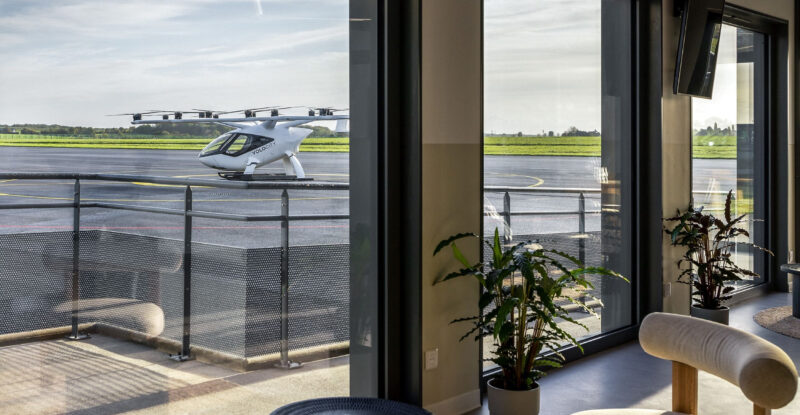Germany’s Volocopter is creating an ecosystem in which its multi-rotor VoloCity eVTOL air taxis will fly from city “VoloPorts”, with the entire construct managed through a cloud-based digital operating system. Volocopter describes this model as a ‘digital-first approach that will translate to end-to-end passenger air transportation experiences’. So, where does SITA fit into that vision?
Sergio Colella, president Europe at SITA, explains: “SITA will become Volocopter’s preferred digital and IT partner for vertiport systems. The companies will collaborate in three principal areas: passenger processing, airside operations, and the overall integration of Volocopter into the existing commercial aviation landscape — in other words, how do we connect the UAM ecosystem to commercial airlines and airports?”
The passenger processing element will examine the passenger experience from registration and biometric enrollment via the Volocopter Passenger Mobile App, through to boarding a VoloCity aircraft at any vertiport hub.
 Airside, SITA will provide the ground systems required by any vertiport operator to manage VoloCity flights, from scheduling and integration with airline systems and other modes of transport, to managing disruption. SITA’s solutions will integrate with the digital operating system, dubbed VoloIQ, which will connect all stakeholders.
Airside, SITA will provide the ground systems required by any vertiport operator to manage VoloCity flights, from scheduling and integration with airline systems and other modes of transport, to managing disruption. SITA’s solutions will integrate with the digital operating system, dubbed VoloIQ, which will connect all stakeholders.
Colella emphasizes that the system will enable vertiports to support multiple operators flying different aircraft types; it is not restricted to the VoloCity or VoloPorts. “Similar to the economies of scale the airline industry has built over time, interoperability and being operator or vertiport agnostic is key for the UAM segment to take off. We want to build vertiport systems as natural peering and aggregation points, with shared components and services, facilitating data exchange and providing cost-efficiency and economies of scale for all parties.
“We are therefore creating an open system that supports different operators and vehicle types, from the passenger experience and airside operations perspectives. It is similar to the common use platform we see in airports, where airlines may have their own customer-facing application but leverage the same passenger-processing touchpoints, including kiosks and boarding gates.”
UAM and eVTOL operations will sit in an unfamiliar space between air and ground transport. Regular fliers will expect levels of safety and security applied even to the shortest eVTOL trip, while those familiar only with hailing a cab or boarding a train may find the requirements irksome or even irrelevant.
Colella is obviously aware of the challenge. “Safety and security will be crucial to air taxi operations, particularly as we look to integrate into the wider airport or transport ecosystem. National and international entities globally are carefully looking at regulation to ensure it meets the same rigorous operating framework used by the wider air transport industry.
“We are closely following those regulatory developments and our knowledge of operating in the regulated air transport industry will be vital to shaping the operating model for this emerging segment. The work includes passenger ID checking where, specifically for Volocopter, the passenger will enroll biometrically through the Volocopter mobile app and then all mandatory identity checks will be performed in the back-end.”
Colella says Volocopter will carry single passengers through its earliest operations, combining on-demand flying with a limited number of scheduled flights. “Initial demand is expected to be low, but as aircraft availability improves, flight times will be more flexible to meet customer demand. This is where Volocopter scheduling will be optimized via the VoloIQ platform.”
The partners have already tested their operating concept in Cergy Pontoise, near Paris, in an initiative led by Aeroports de Paris and vertiport partner Skyports. The first flight involving the new ecosystem is planned for next year. “[W]e are also installing an end-to-end VoloPort testing lab at Volocopter HQ in Bruchsal, Germany,” notes Colella.
Volocopter sums up its proposition thusly, “Imagine you try to become Boeing, Lufthansa and Uber and in one single company. Our goal is to have the VoloCity ready to fly at the 2024 Paris Olympics.” It explains its path to certification in the following video.
https://www.youtube.com/watch?v=3YIMYonz2b4
Related Articles:
- Lilium sees premium service entry for Lilium Jet eVTOL
- Dynamic duo Eve and United work to define UAM ecosystem
- Dubai sightseeing seen as perfect introduction for eVTOL service
- Joby agrees early eVTOL introduction with Delta
- Press Release: Diehl expands cooperation with Volocopter for VoloCity
Featured image credited to SITA













